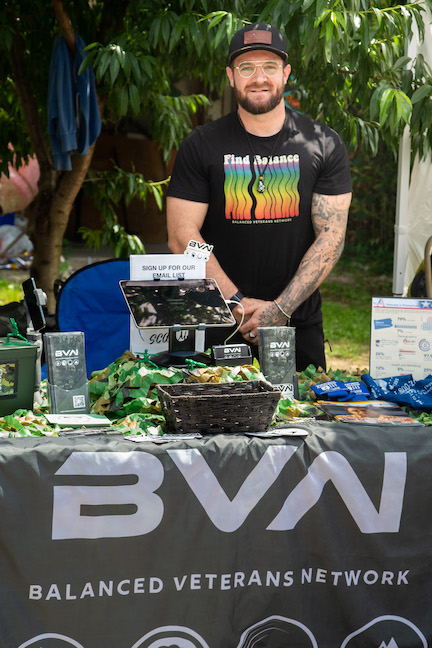Ron Millward, Pennsylvania
Ron Millward joined the Air Force at age 17, while he was still in high school. He served eight years through multiple deployments. Today, his mission is to help other veterans find ways to achieve balance after their military service.

But Ron was struggling to make sense of what had happened to him, what was happening to his buddies after they returned home. He had already lost four of them to suicide. Ron spiraled downward.
“I lost touch with who I was,” Ron said. “I didn’t have a purpose.”
In a moment of despair, he washed down a bottle of pills with alcohol and waited to die. He woke up in a psych ward.
“That meant more meds, but I also got time to reflect,” Ron said. “That was the start of awareness of the military trauma.”
Ron decided to make some big changes. He adopted a plant-based diet and turned to fitness. He enrolled in bible college and became active in a local church community. But he was still struggling and decided he didn’t want to deploy anymore. He received an honorable discharge from the Air Force in 2014.
It was a friend in a music group at church who first suggested cannabis might be a substitute for all the pharmaceutical drugs Ron was taking. Turned out, the friend was right.
“For the first time in my life, I felt a disconnect from the chaos,” Ron said.
As a very conservative military man, he had bought into the cannabis stigma, so he had no prior experience or friends to guide him. It was a journey of discovery, trying to find the right dosages and products that worked for him.
“What path and what combination of things works? Nothing is simple, life is complicated,” Ron said. “Health and wellness are your biggest investment.”
Ron was able to phase out all the medications as diet, exercise, and cannabis began to make a difference. He was getting some talk therapy, but at that time in Washington, D.C., there was not much support.
“No one wanted to talk about it with vets. I was lost, with nowhere to ask questions.” Ron remembers. “That prompted me to create community. I thought there has got to be a way to facilitate the transition out of military life.”
 Ron launched the Balanced Veterans Network (BVN) in 2018 in collaboration with other veterans. The leadership team is still small, with five stipend staff and 15 volunteers, but they are making a big impact. The organization is a registered nonprofit in Pennsylvania, New Jersey and Illinois. At the National Cannabis Festival in Washington, D.C., BVN hosted a wellness room that saw 1,600 veterans and family members come through. But most of BVN’s outreach and education work happens online.
Ron launched the Balanced Veterans Network (BVN) in 2018 in collaboration with other veterans. The leadership team is still small, with five stipend staff and 15 volunteers, but they are making a big impact. The organization is a registered nonprofit in Pennsylvania, New Jersey and Illinois. At the National Cannabis Festival in Washington, D.C., BVN hosted a wellness room that saw 1,600 veterans and family members come through. But most of BVN’s outreach and education work happens online.
Through their website, veterans and their families can access a variety of alternative therapies, including yoga and meditation, and get information about cannabis, including how to use it effectively and cultivate. BVN helps veterans get state medical cannabis registration cards for free or reimburses veterans’ costs.
BVN has several active projects, including launching a new app on Apple and Android, and they are hoping to hold more in-person events.
“I want BVN to have some type of retreat where we can introduce veterans to a wellness toolbox that includes mental, physical and emotional aspects,” Ron said.
BVN is working to bridge the gap between VA care and wellness. One tool is the downloadable “Wellness Resource Guide for Veterans,” produced in partnership with the Cannabis Creative Movement, that provides information about non-traditional therapies and other wellness practices.
“There is no single blueprint, no one way,” Ron said. “We need to provide different options so folks can find what works for them.”
For more information on the Balanced Veterans Network, visit their website at www.balancedveterans.com.
This profile was originally published in the November 2022 ASA Activist Newsletter
Share this page






















